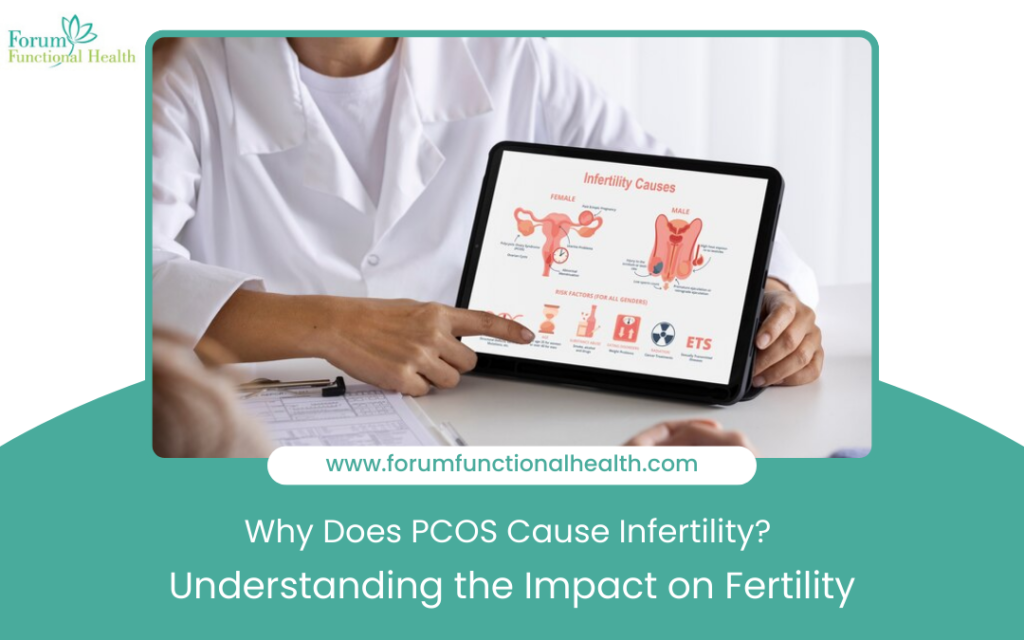Why Does PCOS Cause Infertility? Understanding the Impact on Fertility

Polycystic ovary syndrome (PCOS) is a complex hormonal disorder that affects many women worldwide. One of the most challenging aspects of PCOS is its impact on fertility. If you’ve been diagnosed with PCOS or are struggling with infertility, understanding how this condition affects your ability to conceive is essential. In this article, we’ll explore why PCOS causes infertility and discuss the various treatment options available in Texas.
Understanding PCOS and Its Symptoms
PCOS is characterized by hormonal imbalances that can lead to a range of symptoms, including irregular menstrual cycles, weight gain, acne, and excessive hair growth. Many women with PCOS also experience issues with ovulation, which can make it difficult to conceive.
When asked, Does PCOS cause infertility? the answer is often yes. The hormonal imbalances associated with PCOS can lead to anovulation (the absence of ovulation), which is a primary reason for infertility in women with this condition.
The Hormonal Imbalance of PCOS
The hormonal irregularities in PCOS primarily involve elevated levels of androgens (male hormones), such as testosterone, and imbalances in insulin levels. Here’s how these factors contribute to infertility:
1. Anovulation
One of the most significant impacts of PCOS on fertility is the lack of ovulation. When the body produces excess androgens, it can disrupt the normal ovulation cycle, leading to irregular periods or missed ovulation altogether. Women with anovulation may struggle to conceive, as ovulation is a crucial part of the fertility process.
2. Insulin Resistance
Many women with PCOS also experience insulin resistance, which can lead to higher insulin levels. This, in turn, can increase androgen production, exacerbating the hormonal imbalance and further affecting ovulation.
3. Uterine Lining Issues
PCOS can lead to an abnormal buildup of the uterine lining, known as endometrial hyperplasia. This condition can create an inhospitable environment for implantation, making it more challenging for an embryo to take hold if conception does occur.
PCOS and Perimenopause: A Compounding Factor
As women age, they naturally transition into perimenopause, which can further complicate PCOS. The hormonal fluctuations during perimenopause can intensify the symptoms of PCOS, including irregular cycles and increased infertility risks. Understanding the link between PCOS and perimenopause is essential for those navigating these stages of life.
The Emotional Toll of PCOS-Related Infertility
Dealing with infertility can be emotionally draining. Women with PCOS often feel a mix of frustration, sadness, and anxiety as they grapple with their fertility challenges. Joining a PCOS forum can provide support and understanding from others who are experiencing similar struggles. Sharing experiences and advice can help you feel less isolated and more empowered.
Seeking Treatment for PCOS
If you’re struggling with infertility due to PCOS, it’s crucial to seek effective treatment. Fortunately, there are various options available to help manage your symptoms and improve your chances of conception.
1. Lifestyle Changes
Making healthy lifestyle choices can have a significant impact on managing PCOS. Consider the following:
- Balanced Diet: Focus on whole foods, such as fruits, vegetables, lean proteins, and whole grains. A low-glycemic diet can help manage insulin levels.
- Regular Exercise: Physical activity can help regulate your hormones and improve insulin sensitivity.
2. Medical Treatments
In Texas, the Forum Functional Health Center offers specialized PCOS treatment in Texas, tailored to individual needs. Common treatments include:
- Medications: Birth control pills can help regulate menstrual cycles and reduce androgen levels. Additionally, medications like metformin can improve insulin sensitivity.
- Ovulation Induction: Fertility medications, such as clomiphene citrate, can help stimulate ovulation in women who do not ovulate regularly.
For more information on polycystic ovary syndrome (PCOS) treatment in McKinney, TX, you can visit our website here.
3. Supportive Therapies
Consider exploring supportive therapies like acupuncture or mindfulness practices to manage stress. Reducing stress can help improve hormonal balance, making it easier to conceive.
Conclusion: Taking Control of Your Fertility Journey
Understanding why PCOS causes infertility is the first step toward taking control of your reproductive health. With the right knowledge, support, and treatment, it is possible to manage PCOS and improve your chances of conception.
If you’re in Texas and seeking personalized care, reach out to the Functional Health Center in Texas. Our team is dedicated to helping you navigate your PCOS journey with compassion and expertise. Remember, you are not alone on this journey, and with the right support, hope is always within reach. Contact Forum Functional Health in Texas.
